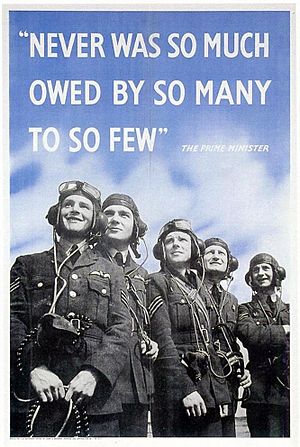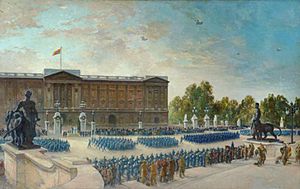The Few facts for kids
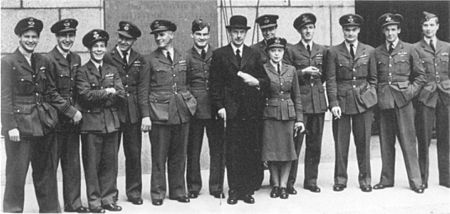
The Few were brave airmen from the Royal Air Force (RAF) and the Fleet Air Arm of the Royal Navy. They fought in the important Battle of Britain during World War II. This special name comes from a famous quote by Winston Churchill, who was the Prime Minister at the time. He said, "Never, in the field of human conflict, was so much owed by so many to so few." It means that a small group of people did something incredibly important for many others. The name also reminds us of a line from Shakespeare's play, Henry V: "We few, we happy few, we band of brothers..."
Who Were The Few?
Nearly 3,000 airmen earned a special medal clasp for fighting in the Battle of Britain. Most of these brave pilots were British. However, many others came from different parts of the British Empire, like New Zealand, Canada, Australia, and South Africa.
There were also pilots from countries in Europe that had been taken over by Germany. These included brave airmen from Poland and Czechoslovakia. Smaller groups came from Belgium, France, Ireland, Southern Rhodesia, and even the United States. These pilots all worked together to defend Britain.
As of 2022, only one of these original pilots, John Hemingway, is still alive.
The Legacy of The Few
Winston Churchill's famous words, "Never in the field of human conflict was so much owed by so many to so few," perfectly describe the importance of these airmen. Because of his words, the pilots who fought in the battle have been known as The Few ever since.
They are often remembered on September 15th, which is called "Battle of Britain Day." On this day in 1940, the German air force, called the Luftwaffe, launched its biggest attack yet. All of the RAF had to fight to defend London and the south-east of England. The British won a major victory that day, which was a turning point in the war.
The popular TV show Horrible Histories even has a song called “The Few” that celebrates these amazing airmen and women. It mentions famous pilots like Sir Douglas Bader.
Memorials and Tributes
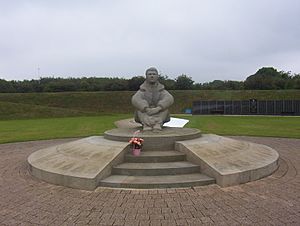
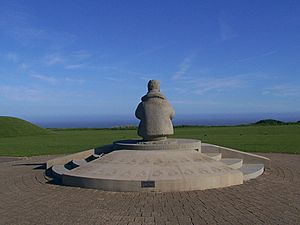
The brave airmen are remembered at the Battle of Britain Memorial, Capel-le-Ferne, in Kent. Their names are also listed on the Battle of Britain Monument in London. A special list of their names, called the Battle of Britain Roll of Honour, is kept in the RAF Chapel at Westminster Abbey. It is shown every year during a special service on Battle of Britain Sunday.
There is a preserved Hawker Hurricane fighter plane called "The Last of The Many." This name is a nod to an old film about the designer of the Spitfire plane. This Hurricane flies as part of the Battle of Britain Memorial Flight, along with a Supermarine Spitfire that actually flew in the battle.
In 2022, a new sculpture called the Spirit of the Few Monument was revealed at the Kent Battle of Britain Museum.
Battle Facts
The Battle of Britain officially took place between July 10 and October 31, 1940.
- RAF pilots believed they shot down about 2,600 German planes. Later figures suggest the actual number was closer to 2,300.
- Out of 2,332 Allied pilots who flew fighter planes, about 39% managed to shoot down at least one enemy aircraft.
- Only about 15% of the RAF pilots involved shot down more than one plane.
- A pilot was called an "ace" if they shot down five or more enemy planes. During the Battle of Britain, 188 RAF pilots became aces. This was about 8% of all the pilots who fought. Many more pilots became aces later in the war.
- Four pilots became "ace in a day" during the Battle of Britain. This means they shot down five planes in a single day! These pilots were Archie McKellar (British), Antoni Głowacki (Polish), Ronald Fairfax Hamlyn (British), and Brian Carbury (New Zealander).
Some of the top aces during the Battle of Britain included:
- Eric Lock (United Kingdom)
- Archie McKellar (United Kingdom)
- James Lacey (United Kingdom)
- Josef František (Czechoslovakia)
- Brian Carbury (New Zealand)
- Witold Urbanowicz (Poland)
- Colin Gray (New Zealand)
- Bob Doe (United Kingdom)
- Paterson Hughes (Australia)
- Michael Crossley (United Kingdom)
 | Lonnie Johnson |
 | Granville Woods |
 | Lewis Howard Latimer |
 | James West |


